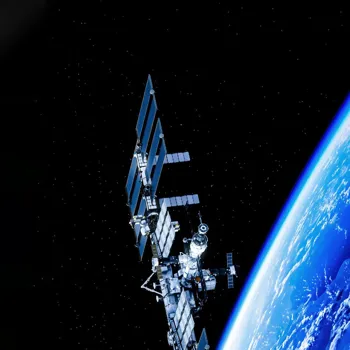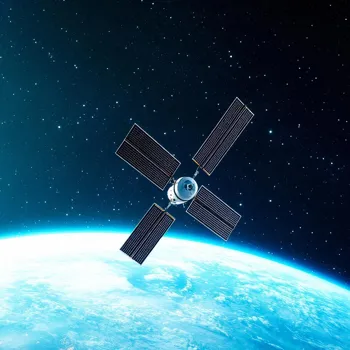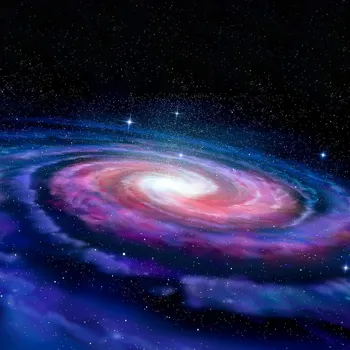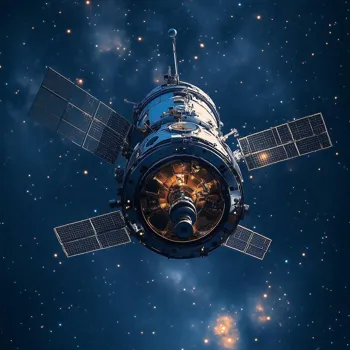Explore the International Space Station: A 'Gurukul' in the Sky for Cutting-Edge Science. Discover the wonders of space research!
The International Space Station (ISS), orbiting our planet at a height of
approximately 400 kilometers, is more than just a marvel of engineering.

It is a unique laboratory, continuously circling the Earth, providing scientists with an unparalleled platform to conduct experiments in a microgravity environment.
This 'Gurukul' in the sky, as some Indian scientists fondly refer to it, is playing a pivotal role in advancing scientific knowledge across various disciplines, from medicine and materials science to astrophysics and Earth observation.
It serves as a symbol of international collaboration, bringing together researchers and resources from various nations to tackle some of humanity's most pressing challenges.
The continuous operation of the ISS allows for long-duration experiments that are simply impossible to conduct on Earth, leading to breakthroughs that are changing our understanding of the universe and ourselves.
The ISS microgravity enables scientific breakthroughs in material science and drug design
The microgravity environment of the ISS is the key to its scientific value. On Earth, gravity influences almost everything, making it difficult to study certain phenomena in isolation. Imagine trying to understand how a crystal grows without gravity causing heavier elements to settle at the bottom.

Or, consider the challenges of studying fluid dynamics when convection currents, driven by gravity, constantly interfere. The ISS eliminates these challenges, allowing scientists to observe fundamental processes in a purely controlled environment.
This ability opens doors to new discoveries in material science. Scientists can create new alloys and materials with unique properties that are impossible to manufacture on Earth.
These new materials could revolutionize industries like aerospace, electronics, and medicine, leading to lighter, stronger, and more efficient products.
Moreover, the experiments conducted on the ISS related to protein crystallization, which is the process of growing protein crystals, aids greatly in drug design to understand protein structure.
ISS biomedical research aids human health on Earth
One area where the ISS has made significant contributions is in biomedical research. The human body undergoes various physiological changes in space. Studying these changes provides valuable insights into the effects of aging, bone loss, and muscle atrophy on Earth.
For instance, astronauts experience a decline in bone density similar to that seen in osteoporosis. By studying the mechanisms behind this bone loss in space, scientists can develop new strategies to prevent and treat osteoporosis on Earth.
Similarly, research on muscle atrophy in space helps in the treatment of muscle-wasting diseases. Cardiovascular issues also change when humans go to space, allowing for more treatment options in case of heart dieses.
The insights gained from these investigations benefit not only astronauts but also millions of people on Earth who suffer from these conditions. Research on the ISS offers opportunities to develop novel therapeutics and interventions to improve human health and well-being.
The ISS aids Earth observation, benefiting climate studies and disaster response worldwide
The ISS is also an ideal platform for Earth observation. Equipped with a variety of sensors and cameras, the station provides a unique vantage point for monitoring our planet's climate, environment, and natural disasters.

Scientists can track changes in sea levels, monitor deforestation, and study the impact of pollution on ecosystems. Data from the ISS helps improve weather forecasting, manage natural resources more effectively, and respond to emergencies like floods and wildfires with greater precision.
The continuous monitoring of Earth from the ISS is crucial for understanding the complex interactions between the Earth's systems and for developing strategies for sustainable development.
Indian scientists are increasingly utilizing data from the ISS to study the monsoons, agriculture, and coastal environments in India, contributing to the nation's resilience to climate change.
The ISS advances astrophysics research, exploring cosmic mysteries
Beyond applied research, the ISS also serves as a platform for fundamental science, particularly in the field of astrophysics. The station provides a stable and relatively interference-free environment for observing the universe.

Experiments on the ISS have helped scientists study cosmic rays, dark matter, and the formation of stars and galaxies.
The Alpha Magnetic Spectrometer (AMS), a particle physics detector installed on the ISS, is searching for evidence of dark matter and antimatter, providing crucial insights into the fundamental building blocks of the universe.
These explorations help us address some of the most fundamental questions about the origin and evolution of the cosmos. The research conducted on the ISS enhances our understanding of the universe and expands the horizons of human knowledge.
International Space Station showcases global cooperation in space, driving scientific progress and innovation
The International Space Station represents a triumph of international cooperation and scientific innovation. It demonstrates that by working together, nations can achieve remarkable feats that benefit all of humanity.

As the ISS continues to operate, it will undoubtedly play a vital role in shaping our future, driving technological advancements, improving human health, and expanding our understanding of the universe.
Indian scientists have been increasingly involved in ISS research, contributing to various projects. And with growing capabilities in the space sector, India is poised to play an even bigger role in the future of space-based research contributing to a global understanding of Earth and space.
The journey of scientific discovery on the ISS is far from over, and the coming years promise even more exciting breakthroughs.
AI Generated Content. Glance/InMobi shall have no liability for the content














